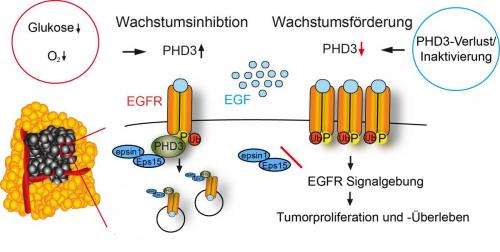Why cancer cells grow despite a lack of oxygen

Healthy cells reduce their growth when there is a lack of oxygen (hypoxia). This makes it even more surprising that hypoxia is a characteristic feature of malignant tumours. In two publications in the current edition of the Nature Communications journal, researchers from Goethe University and Justus-Liebig-University of Giessen report on how cancer cells succeed at circumventing the genetic program of growth inhibition.
It has long been known that PHD proteins (prolyl-hydroxylase domain proteins) play a key role among the regulators of hypoxia. They control the stability of the hypoxia-induced transcription factors (HIFs) which govern the adaptation of cells to a lack of oxygen. The two teams led by Professor Amparo Acker-Palmer, Goethe University, and Professor Till Acker, Justus-Liebig-University, have now discovered that a special PHD protein, PHD3, also controls the epidermal growth factor receptor (EGFR).
In healthy cells, PHD3 responds to stressors such as a lack of oxygen by stimulating the uptake of EGF receptors into the cell interior. Growth signals are down-regulated by this internalisation. "We have discovered that PHD3 serves as a scaffolding protein, binding to central adapter proteins such as Eps15 and Epsin1 in order to promote the uptake of EGFR into the cells," says Acker-Palmer. This process is disrupted in tumour cells due to the loss of PHD3. As a result, the internalisation of EGFR is suppressed, which leads to overactivity of EGFR signals, and thus to uncontrolled cell growth.
The research team was able to show that the loss of PHD3 is a crucial step in the growth of human malignant brain tumours (glioblastomas). The tumour cells thus become refractory to the growth-inhibiting signals under hypoxia. "Clinically, this discovery is highly relevant, because it shows an alternative mechanism for the hyperactivation of the EGF receptor that is independent of its genetic amplification. It can be therapeutically suppressed by EGFR inhibitors," explains Till Acker, a neuropathologist at the University of Giessen.
"Our work shows an unexpected and new function of PHD3 on the interface of two currently red-hot research areas: Oxygen measurement and EGFR signalling," Acker-Palmer explains. "This once again proves how significant growth receptor internalisation is to the development of cancer." This connection was already shown by the research team in 2010 for tumour angiogenesis (Sawamiphak et al, Nature 2010).
More information: Henze et al: Loss of PHD3 allows tumours to overcome hypoxic growth inhibition and sustain proliferation through EGFR; Nature Communications 25.11.2014; DOI: 10.1038/ncomm6582
















